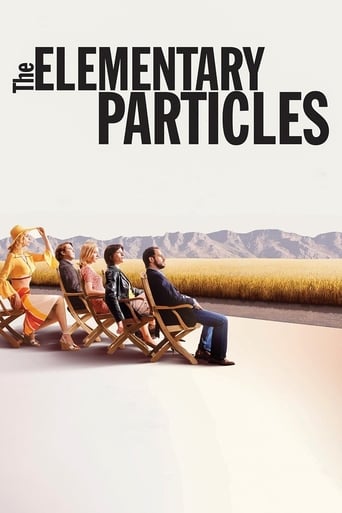

"Elementarteilchen" is a German film from almost 10 years ago and it runs for almost two hours. I will not mention all the cast members here, but this is really impressive. So many big name actors from Germany in here. I cannot think of another film in recent years that had equally many. Oskar Roehler, one of Germany's more known filmmakers these days, directed this film and also adapted Michel Houellebecq's novel for it. Probably his most famous film. Moritz Bleibtreu and Christian Ulmen play the main characters here, two brothers with very damaged relationships to woman and the reason may be their childhood and upbringing. This film touches some taboos, such as sexual relationships between teachers and students or even with your parents, but both is not elaborated too much into detail, so you can watch this without really having to puke. Bleibtreu did a fine job and deserved the awards attention he got for this. I am not really a great fan of his, so my perception of his strong performances is even more telling. It may be his finest character work. Ulmen, on the other hand I am not too big on here. It seems to me that he usually playing very similar characters and he found his niche. I would love to see him in a more daring portrayal, but he usually goes with nerdy intelligent guys with a touch of awkwardness. Still, it's a good contrast to Bleibtreu's character. Both brothers are on a journey to finding real love and a lasting relationship. Both manage in the end, but they have to pay a huge price as both their significant others turn out physically damaged and emotionally they probably are as well. "Elementarteilchen" is probably among the best German films from 2006 and I recommend it.
... View MoreThis raw, disturbing, yet poignant and captivating film caught me by surprise and kept me hooked right through to the bitter-sweet end. Set fifty years in the future, but mostly told through vignettes of the past, one could easily be forgiven for failing to see that it is, in part, a work of science fiction. The Elementary Particles (also known as Atomised) is the film adaption of a novel by French author Michel Houellebecq. The storyline revolves around the bleak, day to day lives of two brothers: Bruno Klement, (an anguished, depressed sex addicted and dysfunctional teacher, played by Moritz Bleibtreu), and Michel Djerzinski , (a painfully shy, introverted scientist played by Christian Ulmen ). Both men's awkward inability to function like 'normal' human beings is palpably exposed as each struggles and stumbles his way through life; the aftermath, it appears, of a chaotic childhood with a mostly absent hippy Mother, Jane, played by Nina Hoss. Bruno is moved from one abusive boarding school to another, eventually finding himself in a loveless marriage while Michel is raised by his paternal grandmother, and determinedly eschews all physical female contact while immersing himself in academia - aptly as a molecular biologist desperate to 'remove love' from the reproduction process through his life's work. Bruno's frantic, uncontrolled need for sex and female company has him lunging into disturbing, unsatisfactory, loveless and often perverted sexual encounters but never finding the 'connection' he so desperately seeks. The boys are unaware of each other's existence until their teens when Jane casually introduces them and they find they are complete opposites in every way; except the most important one - their inability to form healthy, satisfying human relationships - and that's where this movie excels; sensitively and cleverly portraying unvarnished hopelessness, despair and loneliness. Both Bruno and Michel are clearly 'empty of love'; Bruno, crass, sad, isolated, sexually deviant and emotionally broken, Michel painfully shy and scared of human contact. The intelligent script, screenplay and skillful acting allow the viewer a seamless transition between the lives of the two men. Touching, embarrassing, forceful and unforgettable, many scenes depicting the pathos of their existence are simply unforgettable . Bruno's pursuit of sex and the awkward realism of his sordid encounters are both entrancing and repellent; Michel's self-imposed isolation, palpably painful. When the brothers eventually stumble onto the one thing they have been seeking or avoiding all their lives, cruel and random events do not lead to the inevitable ending one might expect. It is enough, it seems, to have finally experienced the one thing that has always eluded them. Although The Elementary Particles is by no means an uplifting movie, its ingenious realism and its utter refusal to portray life as anything other than random, cruel, joyous and challenging is what makes it such a great work of art.
... View More... or what Ostrakosmos ( another poster ) said ;) truth be told, the movie tries. it takes random scenes from the novel, it even translates them onto the screen line by line... sometimes. some other times, it rewrites them completely... and poorly. IMO, the problem is that we get only half of the story. or rather, one third... OK, one can't film social criticism - maybe- but at least one shouldn't butcher a splendid novel. we get part of Bruno's desperation and madness, but we don't get to feel or see Michel. what we are given instead is a mere caricature... and it's a pity. the two brothers were each at one end of the human emotions specter. we were given the lower end, but how about the higher one ? I agree, it IS a challenge to bring Michel onto the screen, in a believable way. a challenge the director and the scriptwriter took... and failed at. in the same way, Annabelle's story is ...not diminished, but almost nonexistent. her drama was the catalyst for Michel's drama, but...the movie does not show this. in any way. and on top of all that, the movie starts with the novel's ending, ruining the whole point ! AND it does not touch at all the revolution brought by Michel's utopia ... long story short, in Bruno's language, the novel "delivers" . the movie does not. great soundtrack, though ;) oh, to think what Wim Wenders could have done with this material...
... View MoreThis is a plodding, clueless adaptation of Michel Houellebecq's novel of the same name. It manages to include many of the book's dialogs verbatim, while completely missing its point. The main evidence is the outrageous change of the conclusion - the director just mined the novel for catchy phrases and totally refused to tackle its challenging ideas. Or rather he was not able to notice them. Even apart from that, the adaptation is dumb. One example: when Bruno describes to the psychiatrist the biological details of the decomposition of a human corpse, he uses lines that are there in the book, down to the moths with "the names of Italian starlets" - but they belong to the narrator, not to Bruno! Such knowledge is completely inappropriate for his character.I don't mind the downplaying of the sex scenes - watch some porn if you have never seen it. The causality of the philosophy and culture of the times and the parents' lives on the lives of the main protagonists, the whole point of Michael's enigmatic life, the desperation of the obsession with sex and narcissism of the body, the sheer horror and cruelty of Bruno's existence, all this is downplayed to the point of absence. Houellebecq created a gripping world in his novel that you cannot shake off even if you think you know that he isn't right. The director produced a made-for-TV movie.
... View More